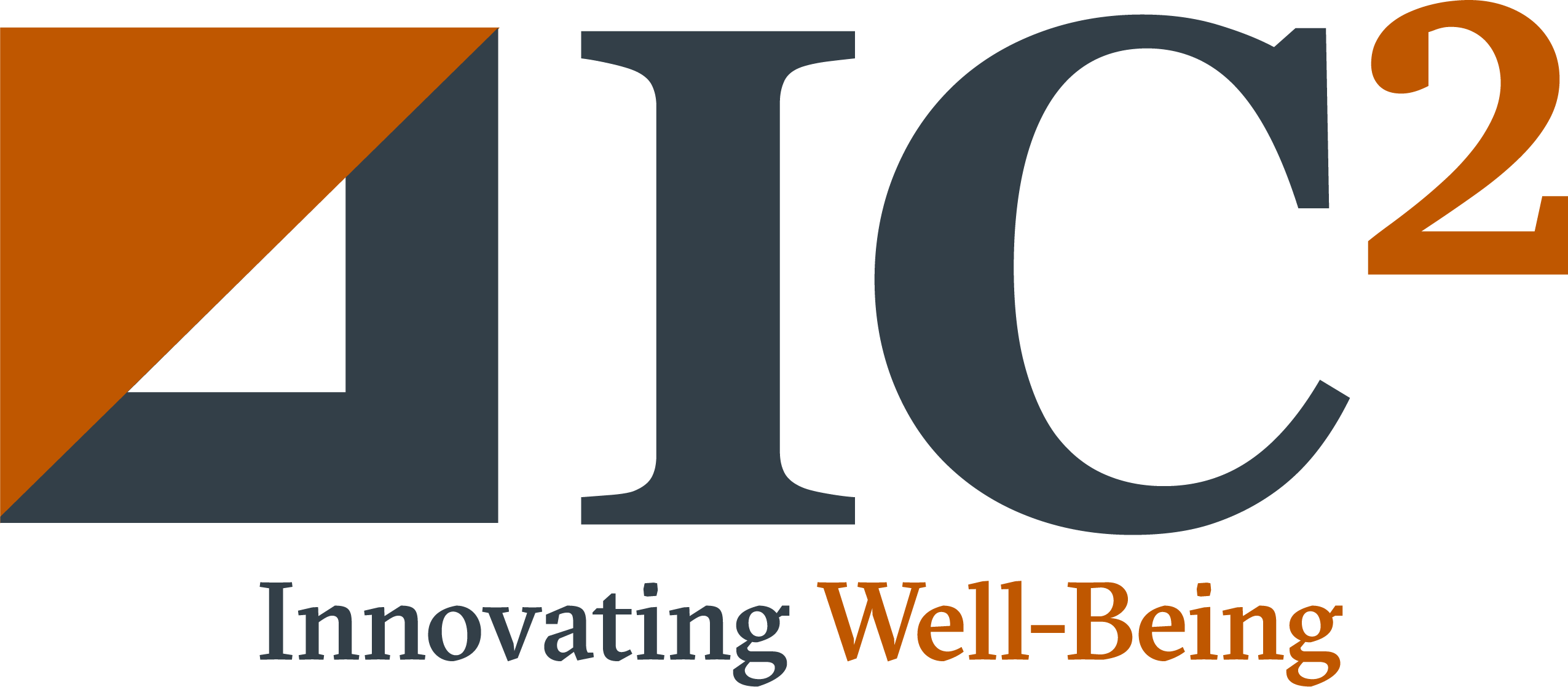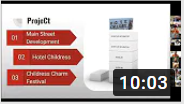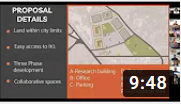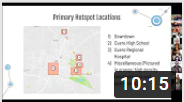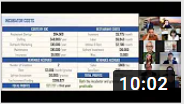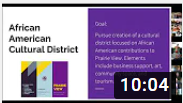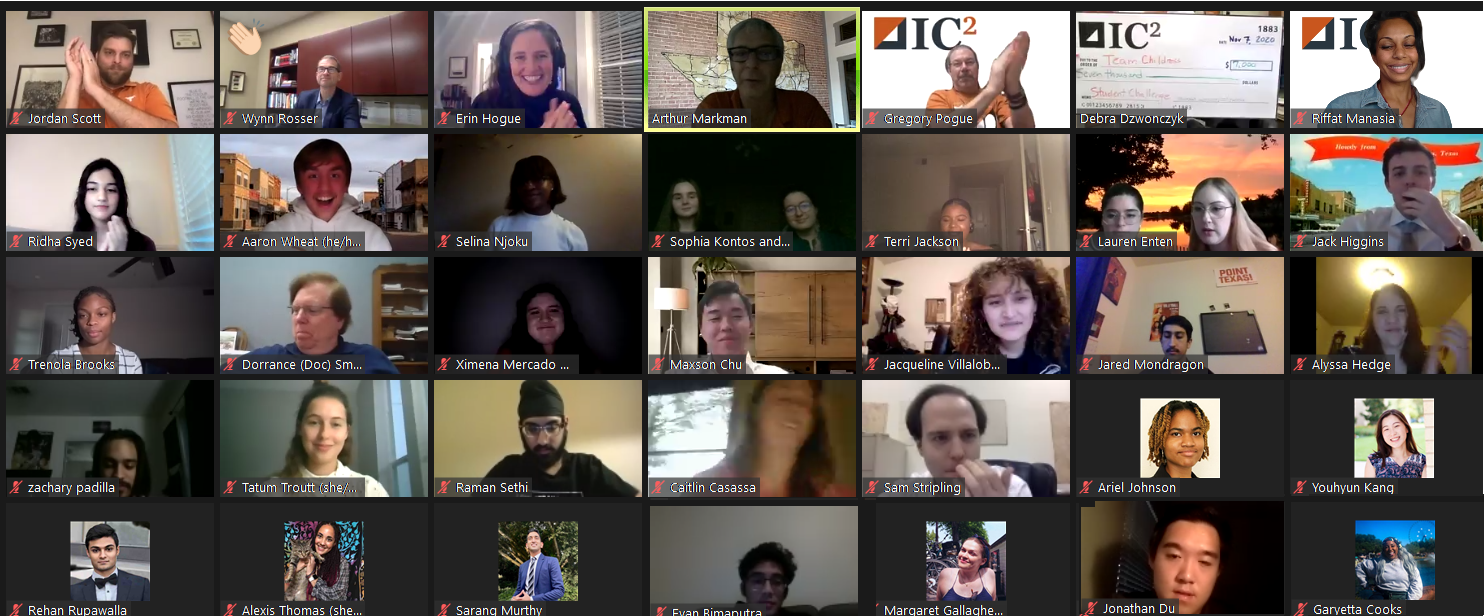
The long-awaited finals of the IC² Institute’s annual student challenge were held Saturday afternoon. The top ten student teams delivered live presentations before a panel of three expert judges, and at the end of the day three happy teams walked away with a total of $15,000 in cash prizes.
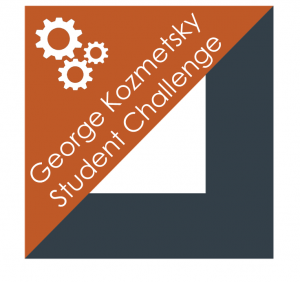
The George Kozmetsky Memorial Student Challenge was started in 2020, and provides an opportunity for UT Austin student teams to demonstrate their research and problem-solving skills as applied to real Texas communities. Similar to a consulting case competition, the teams are given limited time to come up with solutions to complex problems and develop professional-level presentations.
IC² Institute Executive Director, Dr. Art Markman, noted, “This year, the student teams had to solve a problem that was actually identified by the community they studied, which added an additional level of realism.”
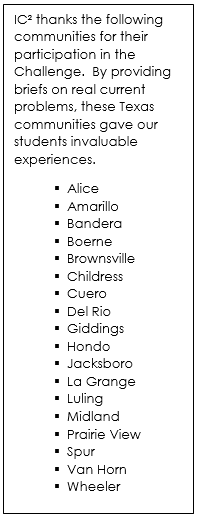
City leaders from across Texas have been engaged with the institute in a program called Regional XLR8, which is designed to help small or remote communities explore pathways to sustainable prosperity. The actual “homework” assignments completed by Regional XLR8 participants were used as prompts for the student work in the Challenge.
One of the three members of the judging panel, Dr. Wynn Rosser, felt that the problems and solutions discussed on Saturday resonated. “I focus on 23 rural counties and know that the problems the teams addressed are real issues—challenges that can either propel a community forward or cause it to be left behind,” Rosser said. “I appreciate the creativity the students brought to their proposed solutions.”
The George Kozmetsky Memorial Student Challenge is named in honor of the founder of the IC² Institute. As with Kozmetsky’s original work at the institute in the 1970s, the Challenge requires an interdisciplinary approach. Although students from any major are eligible to participant, student teams must represent more than one school or college at UT Austin, and the members of each team cannot be all graduate students or all first-year students.
Twenty student teams registered for the Challenge this fall and began working on the research for their communities in late September. Ten days before the finals, each team was given a specific problem brief and had to define a creative but realistic approach.
“All of the teams did a great job learning about their communities. They developed creative solutions to the challenges that were posed, and they put together clear and convincing presentations. I was particularly happy that we had a wide range of students involved in the competition ranging from first year students to grad students and representing many of the colleges and schools at the university,”
– Art Markman, Director IC² Institute
First place was awarded to the team representing Childress, a community facing difficulties encouraging business growth in their downtown area. The Boerne team placed second. Boerne’s problem statement pointed to a lack of available buildings and infrastructure challenges, which make it difficult to compete as a viable option for relocating companies. In third place was the team representing Van Horn, where an ailing water infrastructure has raised concerns about meeting the needs of the current population, as well as any potential growth. An honorable mention was also awarded to the team working with Hondo. A list of all finalists and their UT Austin colleges is provided below.
Cash prizes will be given to the top three teams: $7,000 for first place, $5,000 for second place, and $3,000 for third.
To make the final decisions on awards, IC² recruited an external judging panel. In addition to Rosser, Mr. Jordan Scott, a community advocate and investor, and Dr. Erin Hogue, Director of Community Operations & Northwest Arkansas Giving for the Walmart Foundation, evaluated the students work and presentations. Together, the three judges represented experience in almost every facet of community development.

Far from being intimidating, however, the judges encouraged and inspired the students. According to Aaron Wheat, a member of the winning team, “There was such a rush that came from seeing the judges begin to see our point of view and even agree with it.”
The community leaders who wrote the problem briefs were invited to watch the presentation related to their town, and one dedicated economic development officer viewed all ten presentations. “Each team provided me with an idea that with some refinement can be used in a real world situation,” commented Dorrance (Doc) Smith, the executive director of the Childress Municipal Development District. Many other community representatives plan to follow up separately with the student teams to hear more about their young perspectives.
What Student Participants Had to Say
Team Childress
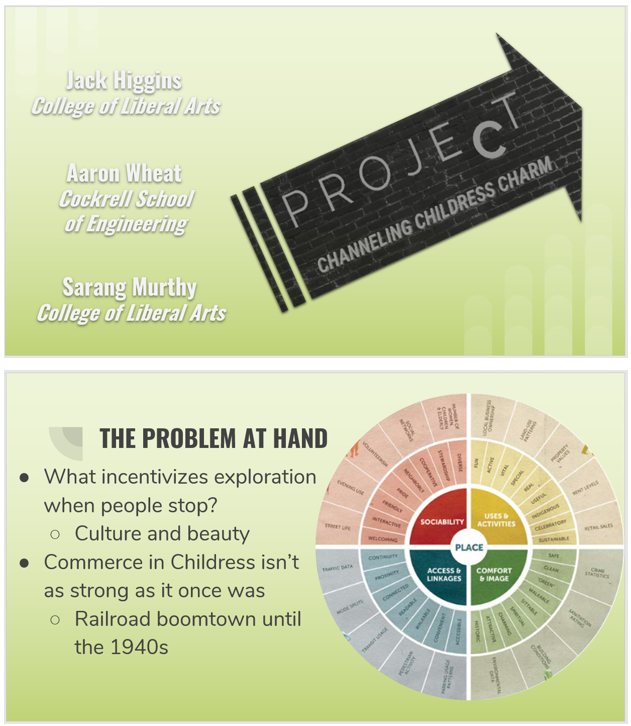
“What sparked our motivation was the problem statement. It was so exciting to see the words written by the community asking us, a group of students, for our professional input. We were finally being put to the test and respected enough to produce a viable economic development solution for Childress, Texas.”
– Aaron Wheat, Cockrell School of Engineering
“The unique thing about the George Kozmetsky Memorial Challenge is that it is a case competition like no other – real communities, real people, real potential. I think this made it personal.”
– Sarang Dev Murthy, College of Liberal Arts
“Working with Aaron and Sarang was a fantastic experience, and I was glad to get to know more about the area of Childress. I’m excited to see how development continues!”
– John Higgins, College of Liberal Arts
Team Boerne
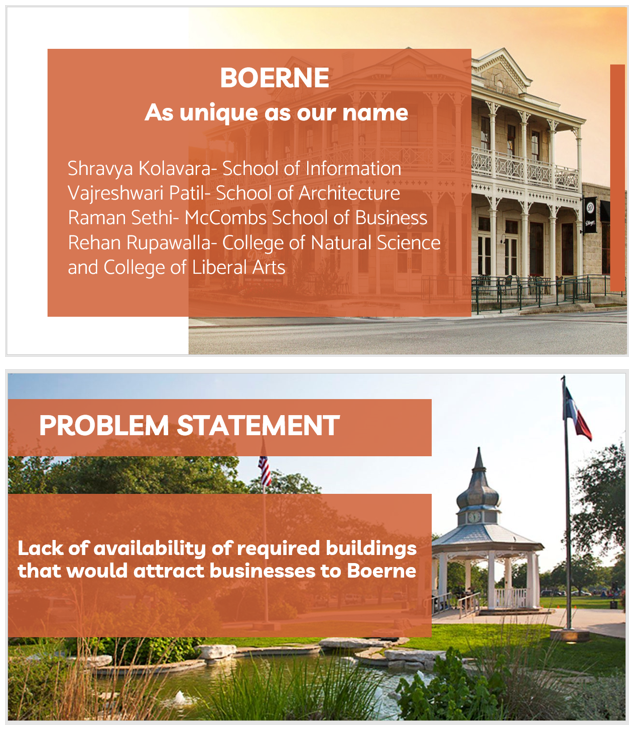
“Overall, this competition made me feel like my work had a lot of real-world pertinence (especially with the Boerne leaders watching the presentation), and that was a really good feeling throughout.”
– Rehan Rupawalla, College of Natural Sciences & College of Liberal Arts
“I am thrilled that I could contribute to the economy and progress of a city in Texas, even as a freshman in college! The exposure to tackling a real-life issue in a limited amount of time in a collaborative setting has been invaluable for my personal and professional growth.”
– Raman Sethi, McCombs School of Business
“I realized that one of the biggest strengths Boerne has is its active community! Community members were super approachable and supportive! We found that they are all striving to do the best for Boerne while keeping it unique!”
– Shravya Naveen Kolavara, School of Information
“After researching and learning so much about Boerne, it seems to be a really beautiful and unique town, and I can’t wait to visit when things get better!”
– Vajreshwari Patil, School of Architecture

Team Van Horn
“What I found most rewarding about this competition is that it allowed us to understand not only a problem in Van Horn, but also a problem for many rural cities in Texas and around the country.”
– Trenola Brooks, Moody College of Communication
“The most enjoyable part for me was talking to the people of the community. You get to learn a lot about the town, its needs, and all the opportunity and potential it has to offer. You also get to meet some really kind and interesting people along the way.”
– Jared Mondragan, McCombs School of Business
“I’m from a small town (Pecos, TX) which is not too far from Van Horn. I think it’s important we don’t forget about these rural areas and continue to make sure these places are able to continue to thrive.”
– Zachary Padilla, Moody College of Communication
Each image below is linked to a video recording for each team’s final presentation.
Winners of the George Kozmetsky Memorial Student Challenge, Nov 2020
- First prize, Childress team (PRESENTATION VIDEO LINK)
- Sarang Dev Murthy, graduate student, College of Liberal Arts
- Aaron Wheat, undergraduate student, Cockrell School of Engineering
- John Higgins, undergraduate student, College of Liberal Arts
- Second prize, Boerne team (PRESENTATION VIDEO LINK)
- Rehan Rupawalla, undergraduate student, Colleges of Natural Sciences and Liberal Arts
- Vajreshwari Patil, graduate student, School of Architecture
- Shravya Kolavara, graduate student, School of Information
- Raman Sethi, undergraduate student, McCombs School of Business
- Third prize, Van Horn team (PRESENTATION VIDEO LINK)
- Trenola Brooks, undergraduate student, Moody College of Communication
- Zachary Padilla, undergraduate student, Moody College of Communication
- Mia Moore, undergraduate student, Cockrell School of Engineering
- Jared Mondragon, undergraduate student, McCombs School of Business
- Honorable mention, Hondo team (PRESENTATION VIDEO LINK)
- Selina Njoku, undergraduate, College of Natural Sciences
- Terri Nicole Jackson, undergraduate, Moody College of Communication
- Garyetta Cooks, undergraduate, College of Liberal Arts
- Alexandra Avila, undergraduate, College of Natural Sciences
- Lauren Enten, undergraduate, College of Natural Sciences
Other finalist teams
- Alice (PRESENTATION VIDEO LINK)
- Evan Pan, undergraduate, McCombs School of Business & College of Liberal Arts
- Kisara Dang, undergraduate, McCombs School of Business & College of Liberal Arts
- Aniket Matharasi, undergraduate, McCombs School of Business
- Atharva Sinha, undergraduate, McCombs School of Business
- Amarillo (PRESENTATION VIDEO LINK)
- Evan Bimaputra , undergraduate, McCombs School of Business & College of Liberal Arts
- Maxson Chu, undergraduate, McCombs School of Business
- Nikhil Guddati, undergraduate, McCombs School of Business
- Juan Esparza, undergraduate, College of Liberal Arts
- Cuero (PRESENTATION VIDEO LINK)
- Ximena Garcia, undergraduate, College of Natural Sciences and College of Liberal Arts
- Sam Stripling, graduate student, College of Liberal Arts
- Ariel Johnson, undergraduate, McCombs School of Business & College of Liberal Arts
- Jacqueline Villalobos, undergraduate, Cockrell School of Engineering
- Alexis Thomas, undergraduate, McCombs School of Business
- Giddings (PRESENTATION VIDEO LINK)
- Thomas Adkins, graduate student, LBJ School of Public Affairs
- Jonathan Du, graduate student, LBJ School of Public Affairs
- Tyler Wilson, undergraduate, College of Liberal Arts
- Jason Xu, undergraduate, Cockrell School of Engineering
- La Grange (PRESENTATION VIDEO LINK)
- Margaret Gallagher, graduate student, School of Architecture
- Youhyun Kang, undergraduate, College of Natural Sciences
- Cheng Xie, graduate student, School of Architecture
- Gabriela Perez, undergraduate, College of Natural Sciences
- Prairie View (PRESENTATION VIDEO LINK)
- Tatum Troutt, graduate student, LBJ School of Public Affairs & School of Architecture
- Alyssa Hedge, graduate student, LBJ School of Public Affairs
- Caitlin Casassa, graduate student, LBJ School of Public Affairs
- Echo Nattinger, undergraduate, College of Liberal Arts
- Sophia Kontos, undergraduate, College of Liberal Arts
The IC² Institute was established at The University of Texas at Austin in 1977, as a think-and-do tank to explore the broad economic, technological, and human factors that drive economic development in regions. Our mission is to better understand and catalyze communities outside major urban corridors to become more collaborative and resilient through a human-centered approach.

